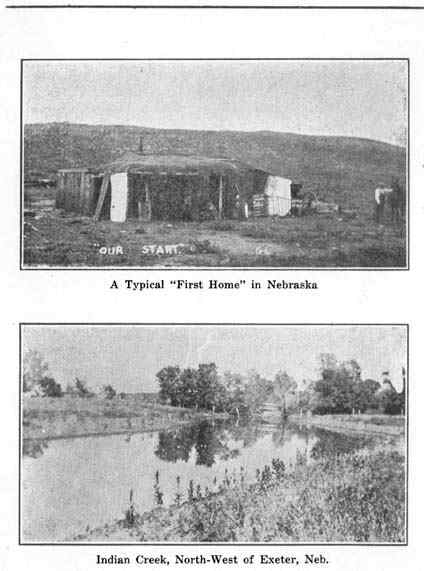scared at first. She says one was a handsome
young. man, stately in bearing, he carried a bow about
four feet across, and a quiver of arrows." After a
serving of fried cakes and other eatables, they went away
satisfied. On another occasion, a Pawnee Indian called.
Mrs. Smith happened to be out of the house, and after
trying the doors and windows, he passed on his way.
One day an Irishman
arrived on horseback and wanted a drink, probably the
white flag with the red S, used as a Store sign attracted
his attention, this being in some parts the Saloon sign.
The pail of water with dipper stood quite near, so he was
told to help himself, but I want a drink; said the
Irishman. Well then, there's the water, help yourself!
said the mistress of the house. But I want whiskey! and
on being told that no such drink was kept there, he tried
several of the patent medicine bottles and failing to
find whiskey he left.
During a thunderstorm, a
flash of lightning made its way down the chimney, and
melted the ends off the wires which stretched across the.
store, upon which were hung different kinds of tinware,
the commotion can well be imagined, but fortunately the
lightning missed the Kerosene Can and passed through the
corner of the floor without causing a fire.
The first child born in
Exeter was Anna E. Smith, daughter of Dr. and Mrs.
Smith.
The first post office
for this community was opened in the spring of 1871 at
the Woodard home, and called Woodard, with that gentleman
as post master. It was soon moved to Exeter and Dr. Smith
was appointed the first postmaster at a salary of $10.00
a year.

MR. AND MRS. JOHN K. BARBER ARRIVED OCTOBER
14, 1870.
Mr. and Mrs. John K.
Barber came to this neighborhood from Woodstock,
Illinois, with a wagon and team. They were five weeks on
the road, and were laid up one week because of bad
weather. They arrived here on October 14, 1870, when upon
recommendation he bought a filing without going to see
the land. They used a sod shanty near the Turkey Creek,
until their Dug-out home, dug-out barn, and cellar were
ready for use, this being accomplished, they entered the
new home in January, 1871.
They soon opened their
home for religious purposes, and had the first preaching
service held in Fillmore County, the Rev. Whiting, a Free
Methodist, being the preacher. In their home was
organized the first Sunday School in the County, a Mr.
Snowdon coming from Lincoln, for that purpose, he
bringing with him some twenty volumes of books to
commence a library. After some months the preaching
service and Sunday School were moved to the Mount Zion
School House, where the Free Methodists carried on the
work, the room often being packed full for the
preaching.
Their first year of
farming was not very encouraging, they had planted Sod
Corn, Buckwheat, Squash, Turnips and Beans. Everything
looked promising until a hail storm struck the farm,
which dashed everything to pieces, excepting the turnips.
This was in the month of July, the hailstones being as
large as pigeons eggs. Then it was that Mr. Barber longed
for the old home and would have returned had it not been
for Mrs. Barber refusing. She believed they could fight
it out, so they remained and have made good. In spite of
drawbacks they were able to have "high" living in those
days, at any rate they can boast of having Venison for
food; this was considered so good that some Esau came
round when the Barbers were away from home and stole half
of the precious "deer." Mr. Barber also killed two
Antelopes and received a share of Buffalo meat from
Palmer Lanacaster (sic), this Mr. Lancaster, on one
occasion, secured, with his own and Mr. Barber's shot
gun, thirteen out of a flock of fourteen wild Geese.
During these early
5
![]()
![]()
![]()
![]()
![]()
![]()
![]()




